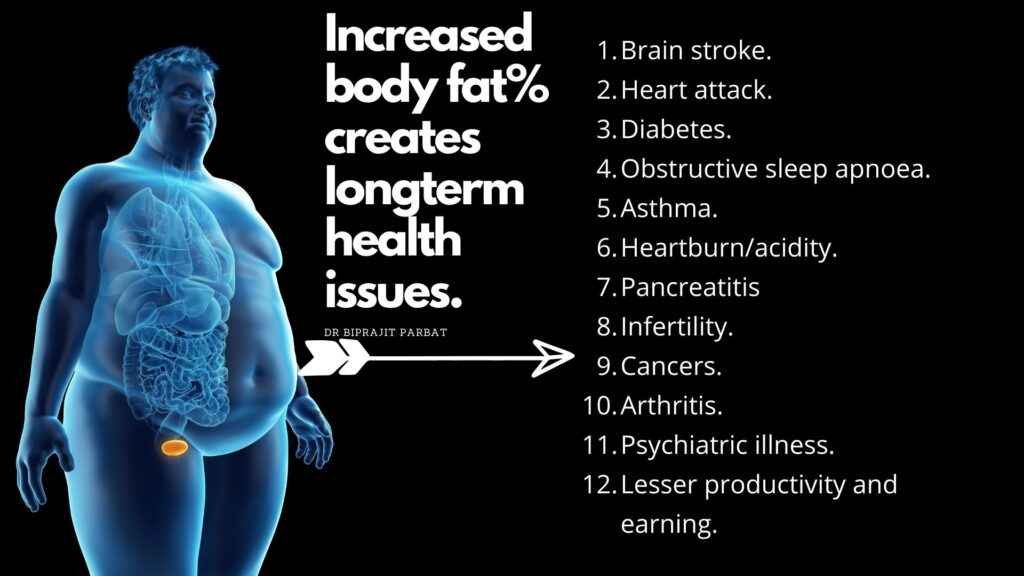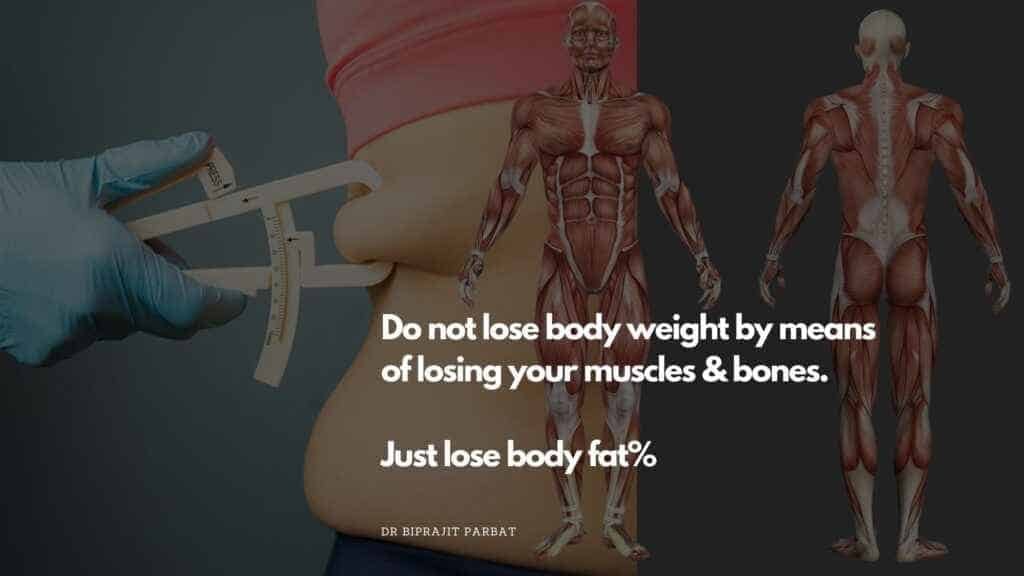Losing body weight is a misnomer. Most of or body weight is made up by bones and the muscles and other vital organs. We do not want to lose the weight of our bones and neither our muscle bulk.
Many a time people measure BMI – means body mass index to measure the obesity. It is a measurement of body weight per unit of height.
It is too general of a measurement of obesity to be true. Persons with higher amount of muscle mass may have higher BMI and obese people may have normal BMI.
Check your BMI

Ideally, we should be targeting the fat that is stored underneath our skin and inside our abdomen. Healthy body has more stronger muscles and bones. And it has normal fat underneath the skin. All the health issues arise from increased body fat percentage.
Lifestyle should be actualized to deal with body fat not overall body weight per unit of height. That way you can have a body with lesser bones, weaker muscles and more fat%. This is not healthy by any scientific measure. So, do not use BMI for losing fat. Use body fat% measurements to do so.
Check your body fat%

12 reasons why to lose body fat%?
- Diabetes –Excess body fat affects insulin that causes diabetes. It leads to other diseases like heart attacks.
- Arthritis – weak muscles around joints which is topped by body fat% leads to degeneration in the joints.
- Heart disease –The plaque builds up inside the artery walls and causes clogged arteries and high blood pressure.
- Obesity is directly correlated with increased chances of brain stroke.
- Obesity increases incidence of obstructive sleep apnoea – it is a sleep issue where patient and snoring and disturbed sleep. This itself increases chances of stoke, heart attack, other lung diseases, diabetes, cholesterol issues etc.
- Asthma is another issue that can happen as the complication of obesity.
- Obesity increases chance of acidity and heart burn. It also increase the incidence of pancreatitis.
- Obesity may lead to polycystic ovarian syndrome (PCOS) in women. This can lead to infertility.
- In men, obesity reduces sexual function.
- Obese females have 20% lesser chance of getting married. They also earn lesser in comparison to obese women.
- Psychiatric disorder like phobia, somatization and obsessive-compulsive disorder chances are also higher.
- There is significant relationship between various cancers i.e gallbladder, esophagus, stomach, kidney, colon and breast.
Click here for scientific reference.

Body fat % is more important than body weight

Fat is essential for all our bodily functions. The various functions of fat in our body are regulating body temperature, cushioning, and insulating tissues and organs. Fat is also the main form of energy storage of the body.
So, what is body fat?
Body fat percentage in simple terms is the percentage of fat that our body has. For example, if someone is 160 pounds and 10% fat that means that he or she is 16 pounds fat and has 144 pounds of lean body mass that include muscle, bone, organ tissue, blood, and all other things.
What body fat percentage is healthy?
Well, ideal body fat for men according to the American Council on Exercise or ACE is the following:
| Category | Percentage |
| Essential Fat | 2-5% |
| Athletes | 6-13% |
| Fitness | 14-17% |
| Acceptable | 18-24% |
| Obesity | >25% |
The ideal body fat percentage based on age for man according to Beth Israel Lahey Health Winchester hospital are:
| Age | percentage |
| 20-39 | 8-19% |
| 40-59 | 11-21% |
| 60-79 | 13-24% |
The ideal body fat percentage based on age for a woman according to Beth Israel Lahey Health Winchester hospital are:
| Age | Percentage |
| 20-39 | 21-32% |
| 40-59 | 23-33% |
| 60-79 | 24-35% |
Another body fat chart for women that is not based on the age for a woman is based in the following categories:
| Category | Percentage |
| Essential Fat | 10-13% |
| Athletes | 14-20% |
| Fitness | 21-24% |
| Acceptable | 25-31% |
| Obesity | >32% |
Keeping your body fat percentage at the ideal level can help to reduce serious and life-threatening diseases like heart disease, diabetes, and cholesterol.
Why is body fat percent more important than bodyweight?
Body fat is far more important than weight because weight includes several things as muscle, water, and bone. Hence if you do not have much muscle your body weight can indicate that you are not overweight although you may be over fat.
You can have a healthy weight without knowing that you may have an unhealthy percentage of fat in your body. It is sometimes referred to as normal weight obesity or skinny fat. Some people appear to be healthy but can have a high body fat percentage. Hence, they are at a high risk of getting serious diseases like diabetes, cholesterol, and heart diseases but it is hard to find that. They are also not motivated enough to do exercises as they think they have good body weight. Therefore, they stop exercising and become more and more unhealthy day by day. So, body fat percent is far more important than body weight.
Twenty tips on how to lose body fat percentage naturally –

A healthy diet is great for improving your body health as well as lowering the risk of several chronic diseases like obesity, heart disease, diabetes, and different types of cancer.
Choosing the best food tips for health can be challenging considering that, there is an overwhelming number of factors to consider. Throwing a wrench into the matters are unlimited dubious sites out there with conflicting nutrition advice from bloggers who never even attended a nutritional class.
If you’re wondering how to eat healthy, here’s a list of the best 12 health and nutrition tips that are scientifically proven.
- Drink enough water. Drinking enough water is important for your health because it may benefit weight maintenance and weight loss and even increase the number of calories you burn daily. Drink 4 to 6 ounces of water a day.
- Cut back on salt. Our bodies need sodium for proper nerve and muscle function and fluid balance, extreme levels of sodium can raise the blood pressure and the risk of stroke and heart disease. WHO recommended daily sodium intake to 5 grams (equivalent to a teaspoon).
- Limit sugar intake. Sugarydrinks can raise the threshold for satiety, thereby increasing the amount you eat and promoting unhealthy weight gain, which can lead to chronic health problems like obesity. To be on the safer side limit yourself on fizzy drinks, fruit juices, and other sweets and sugary drinks.
- Moderate drinking. Heavy alcohol consumption is linked to causing serious problems like heart disease, liver damage, cancer, and mental illness. While there is no safe level of alcohol consumption, it’s important to avoid alcohol at all costs.
- Eat more vegetables and fruits. Fruits and vegetables are good sources of vitamins, minerals, hundreds of beneficial plant chemicals, as well as fiber. Diets rich in vegetables and fruit can benefit the heart by lowering cholesterol levels, blood pressure, inflammation, and improving blood vessel function and insulin resistance.
- Reduce the use of trans fat and oil. We all need some fat in our diet, but eating too much or wrong fats can lead to serious problems. Avoid all processed trans-fat that are high in omega-6 fatty acids, but deficient in omega-3s. A high omega-6 to omega-3 ratio increases risks of obesity, heart disease, osteoporosis, and autoimmune diseases, and stroke. Go for plant oils, nuts, fish, etc.
- Choose a fibre-filled diet, rich in whole grains such as wholewheat pasta, brown rice, or fruits.
- Pile on the proteins. Eating enough protein is vital for optimal health because it boosts metabolism and thus reducing the risk of weight gain. Poultry, fish, nuts, and beans are the best choices.
- Read the nutrition content on foods before you purchase them. If you need help with the labels, ask your dietitian or doctor.
- Avoid refined carbs. Refined carbs have been extremely processed to remove fiber. They are no good for health as they lack essential nutrients. Studies also show that refined carbs are connected to overeating and various metabolic diseases.
- Have a true breakfast Means you have at least fasted for 12 hours and then have taken high fibre and high protein breakfast.
- Take plenty of spices and herbs. Healthy herbs and spices like ginger and turmeric are rich in anti-inflammatory and antioxidants.
- Don’t smoke. Tobacco is linked to heart diseases, lung diseases, and stroke. If you are currently a smoker, quit. It’s a big move toward better health.
- Exercise. Exercising regularly can help reduce stress. You don’t need a sophisticated and tedious fitness routine, either. Take holistic methods like hike, do a yoga class, qigong or pilates, go for a swim, hop on a bike, or even stream an online workout. Each of these methods is great for relaxation.
- Cut Back on Alcohol. Just like smoking tobacco, alcohol is harmful to health. It causes liver cirrhosis, some cancers, and heart diseases. The best way to avoid this, limit yourself to a glass or two of wine once or twice a week. This will not only benefit you, health-wise but also, it’s better for your wallet.
- Go Offline. Taking a digital break from technology, social media, phones, computers, TVs, and tablets will help deepen your personal connection with those around you.
- Optimize Your Sleep. Not only is sleep important for toddlers, but also for adults. On average, a person should sleep between 7-8 hours a day. Your body regenerates and prepares your mind for the new day when you’re asleep. Therefore, getting enough sleep is good for health.
- Pile on Unprocessed Foods. In order to live healthy, limit yourself to processed foods as much as possible. Go for vegetables, fruits, lean meats like chicken and ground turkey, and grains.
- Meditate Regularly. Regular meditation will give you enough energy for self-regulation, concentration on the inner peace and thoughts. Meditation enriches your health overall.
- Be a healthy food promoter – If you declare to yourself & to others that you believe in healthy food and healthy living, you will easily be able to inspire yourself to follow the same.
Conclusion:
Therefore, body fat percentage is more important than body weight. Body fat percentage once brought in the normal range, it can help reduce at least a dozen of long-term health issues. Healthy body, healthy mind means more productive and happy self.





